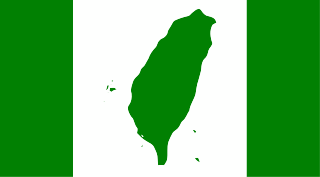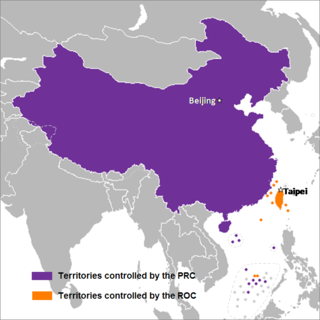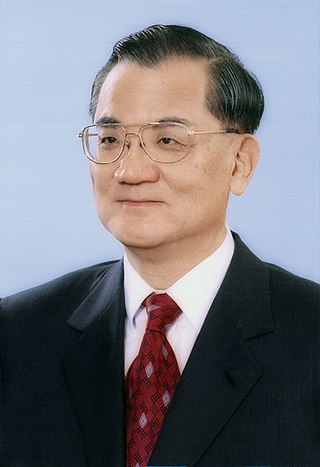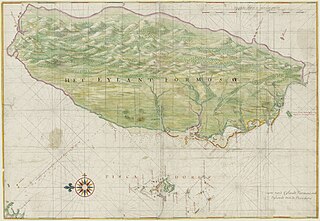
The Democratic Progressive Party (DPP) is a centre to centre-left Taiwanese nationalist political party in Taiwan. It is currently the major ruling party in Taiwan,controlling both the presidency and the central government,also the dominant party in the Pan-Green Coalition.

Taiwan,officially the Republic of China (ROC),is governed in a framework of a representative democratic republic under a five-power system first envisioned by Sun Yat-sen in 1906,whereby under the constitutional amendments,the President is head of state and the Premier is head of government,and of a multi-party system. Executive power is exercised by the Executive Yuan. Legislative power is vested primarily in the Legislative Yuan. Taiwan's judiciary is independent of the executive and the legislature. In addition,the Examination Yuan is in charge of validating the qualification of civil servants,and the Control Yuan inspects,reviews,and audits the policies and operations of the government.

The Taiwan independence movement is a political movement which advocates the formal declaration of an independent and sovereign Taiwanese state,as opposed to Chinese unification or the status quo in Cross-Strait relations.

Chen Shui-bian is a Taiwanese former politician and lawyer who served as the 5th president of the Republic of China (Taiwan) from 2000 to 2008. Chen was the first president from the Democratic Progressive Party (DPP) which ended the Kuomintang's (KMT) 55 years of continuous rule in Taiwan. He is sometimes referred to by the nickname A-Bian (阿扁).

Chinese unification,also known as Cross-Strait unification or Chinese reunification,is the potential unification of territories currently controlled,or claimed,by the People's Republic of China and the Republic of China ("Taiwan") under one political entity,possibly the formation of a political union between the two republics. Together with full Taiwan independence,unification is one of the main proposals to address questions on the political status of Taiwan,which is a central focus of Cross-Strait relations.
The controversy surrounding the political status of Taiwan or the Taiwan issue is an ongoing dispute on the political status of Taiwan,currently controlled by the Republic of China (ROC). This dispute arose in the mid-twentieth century.
One China is a phrase describing the international relationship between the People's Republic of China (PRC),situated on the Chinese Mainland,and the Republic of China (ROC),commonly known as Taiwan. "One China" asserts that there is only one de jure Chinese nation despite the de facto division between the two rival governments in the aftermath of the Chinese Civil War. The term may refer,in alphabetical order,to one of the following:

Lien Chan is a Taiwanese politician. He was the Chairman of the Taiwan Provincial Government from 1990 to 1993,Premier of the Republic of China from 1993 to 1997,Vice President of the Republic of China from 1996 to 2000,and was the Chairman of the Kuomintang (KMT) from 2000 to 2005,apart from various ministerial posts he had also held. Lien ran for the President of the Republic of China on behalf of the Kuomintang twice in 2000 and 2004,but both lost to Chen Shui-bian of the Democratic Progressive Party. Upon his retirement as KMT Chairman in August 2005,he was given the title Honorary Chairman of KMT. He is highly credited after holding a groundbreaking visit to Mainland China in his capacity as the Chairman of the Kuomintang to meet with the General Secretary of the Chinese Communist Party Hu Jintao on 29 April 2005,the first meeting between the two party leaders after the end of Chinese Civil War in 1949,which subsequently helped thaw the long-stalled cross-strait relations.
The Four Noes and One Without,also known as the Four Noes was a pledge by former President of the Republic of China Chen Shui-bian made in his inauguration speech on 20 May 2000,concerning the political status of Taiwan. It was an important part of cross-straits relations.

As a result of the surrender and occupation of Japan at the end of World War II,the islands of Taiwan and Penghu were placed under the governance of the Republic of China (ROC),ruled by the Kuomintang (KMT),on 25 October 1945. Following the February 28 massacre in 1947,martial law was declared in 1949 by the Governor of Taiwan,Chen Cheng,and the ROC Ministry of National Defense. Following the end of the Chinese Civil War in 1949,the ROC government retreated from the mainland as the Chinese Communist Party (CCP) proclaimed the establishment of the People's Republic of China. The KMT retreated to Taiwan and declared Taipei the temporary capital of the ROC. For many years,the ROC and PRC each continued to claim in the diplomatic arena to be the sole legitimate government of "China". In 1971,the United Nations expelled the ROC and replaced it with the PRC.

The Anti-Secession Law is a law of the People's Republic of China,passed by the 3rd Session of the 10th National People's Congress. It was ratified on March 14,2005,and went into effect immediately. President Hu Jintao promulgated the law with Presidential Decree No. 34. Although the law,at ten articles,is relatively short,Article 8 formalized the long-standing policy of the PRC to use military means against Taiwan independence in the event peaceful means become otherwise impossible. The law does not explicitly equate "China" with the People's Republic of China.
The Guidelines for National Unification,or the National Unification Guidelines (NUG),were written by the National Unification Council,an advisory body of the Republic of China government,regarding Chinese unification. The National Unification Guidelines were adopted by the Executive Yuan Council on February 23,1991. The guidelines have a three-step process for the gradual unification of mainland China and Taiwan.

This is a timeline of the Republic of China.
The 1992 Consensus is a political term referring to the alleged outcome of a meeting in 1992 between the semiofficial representatives of the Chinese Communist Party (CCP)-led People's Republic of China (PRC) in mainland China and the Kuomintang (KMT)-led Republic of China (ROC) on Taiwan. They are often credited as creating a diplomatic basis for semi-official cross-strait exchanges which began in the early 1990s and is a precondition set by the PRC for engaging in cross-strait dialogue.
The proposed National Unification Promotion Law of the People's Republic of China is a document that appeared in early 2004 as a suggestion to create formal a legal basis for the People's Republic of China's unification with Taiwan. It was authored by a Chinese scholar Yu Yuanzhou (余元州),a professor from the Jianghan University in Wuhan who does not have a formal governmental position. Although no formal legislative action has been taken on the document,it was widely discussed in China. The reactions to the proposed document was mixed,with some,mainly in Taiwan,saying it provided evidence of hostile intent on the part of the PRC,while others praising it for proposing flexible solutions to the intractable conflict.

Presidential elections were held in Taiwan on 22 March 2008. Kuomintang (KMT) nominee Ma Ying-jeou won with 58% of the vote,ending eight years of Democratic Progressive Party (DPP) rule. Along with the 2008 legislative election,Ma's landslide victory brought the Kuomintang back to power in the Republic of China.
The Four-Stage Theory of the Republic of China or the Theory of the Four Stages of the Republic of China is a viewpoint proposed by Chen Shui-bian,the President of the Republic of China from 2000 to 2008,in 2005. It is a viewpoint regarding the political status of the Republic of China,whose government retreated to the island of Taiwan after the Chinese Civil War in 1949. The main idea of the theory is that the time line for the development of the Republic of China can be classified into four stages,which are:
- The Republic of China on the mainland,1912–1949
- The Republic of China arrival to Taiwan,1949–1988,before Lee Teng-hui's presidency
- The Republic of China on Taiwan,1988–2000,during Lee Teng-hui's presidency
- The Republic of China is Taiwan,2000–now,during Chen Shui-bian's presidency

Cross-strait relations are the political and economic relations between mainland China and Taiwan across the Taiwan Strait.

Taiwanese nationalism is a nationalist movement which asserts that the Taiwanese people are a distinct nation. Due to the complex political status of Taiwan,it is strongly linked to the Taiwan independence movement in seeking an identity separate from China. This involves the education of history,geography,and culture from a Taiwan-centric perspective,promoting native languages of Taiwan such as Taiwanese Hokkien,Hakka,and indigenous languages,as well as reforms in other aspects. Taiwanese nationalism was described as 'anti-imperialist' in that it opposed Japanese imperialism before 1945,opposed Chinese imperialism in modern times,and supported its own Taiwanese identity,which was distinct from China.
Events from the year 2006 in Taiwan,Republic of China. This year is numbered Minguo 95 according to the official Republic of China calendar.











